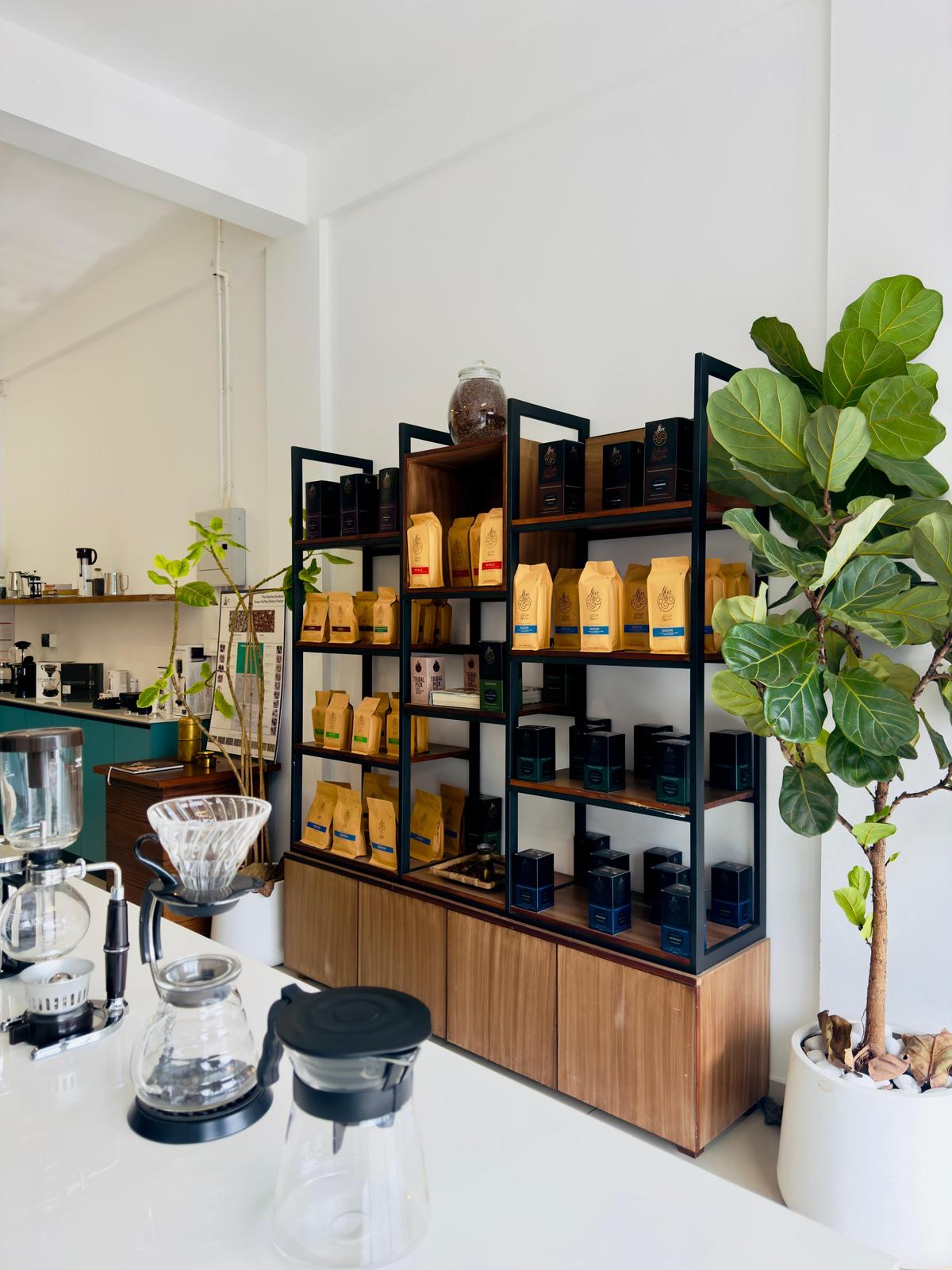[ad_1]

Ffox, an experiential cafe at Aluva
| Photo Credit: SPECIAL ARRANGEMENT
Ffox Coffee at Aluva is not a cafe, but an experience centre.
As I walked in, the owner-founder Joshi Thaliath and product manager Joe Thaliath asked me how I like my coffee. When I said black, they asked if an espresso was okay. They chose Arabica from the Mallikarjuna Estate, situated at the foothills of the Chandragiri Hills. The result was a well-rounded shot, with notes of cocoa, citrus fruits and peach. This was something I would happily drink to start my day.
The duo then went on to ask how I usually brew my coffee. When I said French Press, they went on to take about 300gms of Arabica beans from Chikmaglur and Manjarabad; and put them in a roaster. After a good twelve minutes, the beans, a medium roast, were ready. They were coarse ground, and I had coffee to take home.
Joshi, who worked in the Middle East for 16 years, studied engineering in Chikmaglur, known for coffee plantations. His tryst with and love for coffee piqued during his engineering days — he had friends who came from families that owned coffee plantations or were coffee roasters. In 2011, he decided it was time to start something of his own. He started as a channel partner for Lavazza in India and to know more about coffee, he went to the Coffee Board of India and the Indian Institute of Plantation Management in Bangalore. “I attended Kaapi Shastra, a certified program by the Coffee Board. And was surprised when I learnt that 80 per cent of green coffee in India was being exported,” he says.

Ffox, an experiential cafe at Aluva
| Photo Credit:
SPECIAL ARRANGEMENT
Joshi decided to start Ffox in 2014 and spent around four years doing research. The brand sources coffee from estates in Chikmaglur, Manjarabad, Coorg and Araku valley.
“Everything, from the bean plucking process, to the drying, roasting and grinding, can affect a cup,” says Joshi. There are different ways the coffee could be grown and processed. It could be shade-grown or not; shade dried, probably on multiple beds, raked frequently or not; the beans themselves could be stripped and not plucked individually. They could be washed, peeled, fermented and then let out to be dried. Or set out in the sun directly to be dried, and then peeled. Then there are three kinds of roast — light, medium and dark, he adds. And says, “Our consumers prefer a dark roast, as they like their coffee strong; and they usually use the South Indian filter method of brewing.”
As a homegrown brand from Kerala, Ffox aims to educate Malayalis on the nuances of brewing coffee and how making oneself a perfect cup needn’t be complicated or expensive. “Our aim, for when a customer leaves the store should be able to brew his coffee, as per they like it, with ease. Be it light roast or dark, feeling good after having a cup of coffee is important,” says Joe.
How to brew
For a perfect cup using a French Press, Joshi recommends using 20 grams of coffee, 240 ml water at 93 degrees Celsius. He recommends pre-heating the French Press by rinsing it with hot water and letting the coffee brew for about three to three-and-a-half minutes. For South Indian filter coffee. The recommended ratio would be 1:5; say 100 ml water at 90 degrees Celsius for 20 grams coffee powder, which would give one about 80 ml decoction. As for V-drip or the chemex method, the recommendation would be 240ml water at 90 degrees Celsius for 18 grams of coffee powder.
Fffox Coffee currently supplies its blends to popular dine-out spaces like Roasttown, French Toast, Zera Noya, Edam Cafe and Kaapi Street at Shenoy’s theatre. Currently focused on training baristas, Ffox also plans to start workshops for those looking to get started with coffee brewing.
Try different grounds and blends, brewing methods and take home coffee powder for ₹700 – ₹900.
[ad_2]
Source link





